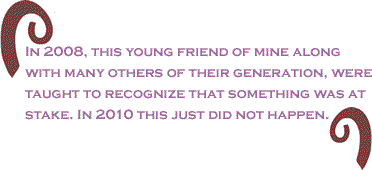| I
had not planned on having this conversation. It came up
in the course of another discussion, the subject of which
I cannot remember. I asked this 20-something friend whether
they had voted on November 2nd. They said “no.” I was
perplexed by this response since they had made a point of
voting in 2008 and had indicated, prior to the 2010 election,
that they would be voting. So, I did not let it drop.
I wanted to understand what happened.
“So, why did you not vote?” I asked.
“I did not get a chance to register
to vote,” was their response. This was not the first time
that I had heard from a new voter the assumption that they
had to register before voting in each election even if they
had already registered.
“You only have to register once, assuming
that you regularly vote,” was my comment.
They looked at me and responded “I
did not realize that.”

The conversation could have ended
there but what was most interesting was what came next.
My 20-something friend told me about an incident which took
place on their campus in the immediate aftermath of the
November 2nd election. Apparently a reporter visited the
campus to ask why younger voters had not voted at the same
rate that they had voted in 2008.
“One of the people they interviewed,”
my friend noted, “said exactly what I had been thinking.
In 2008 they made a point of the importance of voting
in the election. They made a point of reaching out
to young people and speaking with us about why the election
mattered and why our vote counted. In this election no
one did that. We had almost no sense of what was at stake
in the election.” The “they”, in case you have not
guessed, were the Democrats, as well as liberal and progressive
constituency/advocacy groups.
 I
have been reflecting on this conversation ever since. Sure,
you can say that this and other 20-somethings should have
taken initiative but that misses the larger point. In 2008,
this young friend of mine along with many others of their
generation, were taught to recognize that something was
at stake. In 2010 this just did not happen. I
have been reflecting on this conversation ever since. Sure,
you can say that this and other 20-somethings should have
taken initiative but that misses the larger point. In 2008,
this young friend of mine along with many others of their
generation, were taught to recognize that something was
at stake. In 2010 this just did not happen.
In a debate in which I participated
on Aljazeera immediately following the election, a similar
issue came up. What was interesting was that a representative
of the Tea Party movement attempted to argue that youth
have not benefited from the Obama administration and that
this explained the lack of engagement. Perhaps, but what
is interesting is that those youth who did vote voted overwhelmingly
for Democratic candidates.
So, it is reasonable to believe that
two factors played themselves out with youth. One, that
there was little significant attention given to energizing
the youth vote. The assumption that what worked in 2008
would carry over into 2010 was completely misplaced. But
the second factor is that the youth segment of the electorate,
as with many other liberal and progressive voters, were
not prepared to vote for the Republicans but were profoundly
disappointed in the Democrats.
The discussion I had with my 20-something
friend reminded me that no segment of the electorate can
be taken for granted. Inspiration in one electoral cycle
can devolve into despair in the next. But more importantly,
the hope that many youth held in the results of the 2008
election were disappointed by a combination of the repeated
premature compromising on the part of the Obama administration
along with the influence of conservative Democrats.

Conclusion? That a significant youth
turnout in 2012 will necessitate more than outreach, as
important as is outreach. It will necessitate substance.
Specifically, can a social force come together that engages
younger voters (and potential voters) in the fight for power?
Can youth not be called upon to vote for a messiah, but
instead be mobilized by a progressive force to insist upon
the change for which they believed that they were voting
in 2008.
I don’t want to have the same conversation
with my 20-something friend in the aftermath of the 2012
elections.

BlackCommentator.com Editorial Board member, Bill Fletcher,
Jr., is a Senior Scholar with the Institute for Policy Studies, the immediate past president ofTransAfrica Forum and co-author of, Solidarity Divided: The Crisis in Organized Labor and a New Path
toward Social Justice (University of California Press), which
examines the crisis of organized labor in the USA. Click here to contact Mr. Fletcher.
|

